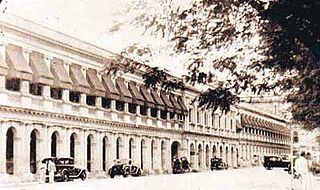This article needs additional citations for verification .(February 2022) |
The Order of Precedence in Sri Lanka the protocol list at which Sri Lankan government officials are seated according to their rank. This is not the list of succession. [1]
This article needs additional citations for verification .(February 2022) |
The Order of Precedence in Sri Lanka the protocol list at which Sri Lankan government officials are seated according to their rank. This is not the list of succession. [1]

The president of Sri Lanka is the head of state and head of government of the Democratic Socialist Republic of Sri Lanka. The president is the chief executive of the union government and the commander-in-chief of the Sri Lanka Armed Forces. The president appoints the Prime Minister of Sri Lanka.

The Parliament of the Democratic Socialist Republic of Sri Lanka is the supreme legislative body of Sri Lanka. It alone possesses legislative supremacy and thereby ultimate power over all other political bodies in the island. It is modeled after the British Parliament.

The governor-general of Ceylon was the representative of the Ceylonese monarch in the Dominion of Ceylon from the country's independence in 1948 until it became the republic of Sri Lanka in 1972.

Sir Oliver Ernest Goonetilleke was a Sri Lankan statesman. Having served as an important figure in the gradual independence of Ceylon from Britain, he became the third Governor-General of Ceylon (1954–1962). He was the first Ceylonese individual to hold the vice-regal post.
The Jamaican order of precedence is as follows:

The Constitution of the Democratic Socialist Republic of Sri Lanka has been the constitution of the island nation of Sri Lanka since its original promulgation by the National State Assembly on 7 September 1978. As of October 2022 it has been formally amended 21 times.
The Ceylon Civil Service, popularly known by its acronym CCS, was the premier civil service of the Government of Ceylon under British colonial rule and in the immediate post-independence period. Established in 1833, it functioned as part of the executive administration of the country to various degrees until Ceylon gained self-rule in 1948. Until it was abolished on 1 May 1963 it functioned as the permanent bureaucracy or secretariat of Crown employees that assisted the Government of Ceylon.
In Sri Lanka, the Cabinet of Ministers is the council of senior ministers responsible and answerable to the Parliament of Sri Lanka. The President is a member of the cabinet and its head.

The Speaker of the Parliament of the Democratic Socialist Republic of Sri Lanka is the presiding officer of the chamber. The current Speaker of the Parliament is Mahinda Yapa Abeywardena, in office since 20 August 2020. The Speaker fulfills a number of important functions in relation to the operation of the House, which is based upon the British Westminster parliamentary system.

The Senate was the upper chamber of the parliament of Ceylon established in 1947 by the Soulbury Commission. The Senate was appointed and indirectly elected rather than directly elected. It was housed in the old Legislative Council building in Colombo Fort and met for the first time on 12 November 1947. The Senate was abolished on 2 October 1971 by the eighth amendment to the Soulbury Constitution, prior to the adoption of the new Republican Constitution of Sri Lanka on 22 May 1972. In 2010 there were proposals to reintroduce the Senate.

Sir Razik Fareed, OBE, JP, UM, also known as A. R. A. Razik, was a Ceylonese landed proprietor, politician and philanthropist. He was the former Cabinet Minister of Trade, Senator, member of parliament and the state council. He had also served as Ceylon's High Commissioner to Pakistan.
The following is the Barbadian Table of Precedence.

The Prime Minister of the Democratic Socialist Republic of Sri Lanka is the head and most senior member of parliament in the cabinet of ministers. It is the second-most powerful position in Sri Lanka's executive branch behind the president, who is the constitutional chief executive. The Cabinet is collectively held accountable to parliament for their policies and actions. The powers and functions of the Prime Minister has changed several times since the creation of the office in 1947.
The 19th Amendment (19A) to the Constitution of Sri Lanka was passed by the 225-member Sri Lankan Parliament with 215 voting in favor, one against, one abstained and seven were absent, on 28 April 2015. The amendment envisages the dilution of many powers of Executive Presidency, which had been in force since 1978. It is the most revolutionary reform ever applied to the Constitution of Sri Lanka since JR Jayawardhane became the first Executive President of Sri Lanka in 1978.
The Honourable or The Honorable is an honorific style that is used as a prefix before the names or titles of certain people, usually with official governmental or diplomatic positions.
{{cite web}}: CS1 maint: archived copy as title (link)